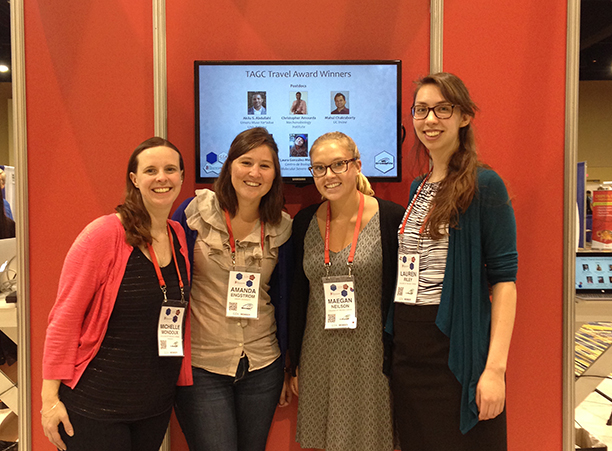
Two faculty members, five students, and one alumna from the College of the Holy Cross attended and presented their research at The Allied Genetics Conference (TAGC), a national meeting held by the Genetics Society of America (GSA) in Orlando from July 13 to 17. The group was led by Geoffrey Findlay and Michelle Mondoux, who are both assistant professors of biology.
Meaghan McGeary ’16 presented the research she performed as a student in Findlay’s lab titled, “Evolution of the Sex Peptide Network: Lineage-specific adaptive evolution correlates with key phenotypic changes.” McGeary’s study used a fruit fly model to examine the evolution of male and female proteins that work together to control reproduction.
Maegan Neilson ’17 and Lauren Riley ’17 presented a poster co-authored with Mondoux and Ryan Buehler ’17, Emma Sikes ’16, Kevin Deehan ’16, and Michael Mastroianni ’16. Their presentation, “The Spinal Muscular Atrophy (SMA) Network Regulates Insulin Signaling in Response to a High-Glucose Diet in C. elegans,” was awarded second place in the C. elegans undergraduate poster competition. Neilson and Riley’s project used the nematode worm as a model for understanding how genes implicated in the human disease spinal muscular atrophy may also regulate insulin signaling. Mondoux’s research on the effects of a high-glucose diet in C. elegans received media attention last fall.
Benjamin Nicholson ’17 presented a poster he co-authored with Findlay and Maxwell Kearns ’16 titled, “Functional characterization of a gene family essential for Drosophila spermatogenesis.” Purva Rumde ’18 presented a poster co-authored with Findlay and Anna Gubala ’16, Tery Vinh ’15, and Mike Kearns ’16 titled, “De novo evolved genes are essential for spermatogenesis in D. melanogaster.” Both projects involved studying how specific genes in fruit flies control the production and function of sperm, argued that by understanding the genetic basis of sperm function in the fruit fly model, it may be possible to design methods that inhibit reproduction in closely related species, like mosquitoes (which transmit human diseases) and certain agricultural pests.
In addition to presenting scientific research, Mondoux presented a poster titled “Using the Yeast Mating Response to Study Genetics and Cell Biology: From the Biology Lab to the Computer Lab and Back.” Co-authored with colleagues from DeSales University, this project assessed how a live and simulated laboratory contributed to student learning in Mondoux’s course on cell biology. Mondoux also co-organized and moderated an undergraduate workshop at the conference.
Amanda Engstrom ’12, a former research student in the Mondoux lab, also attended the conference. She is currently working on a mouse model of Alzheimer’s disease in the biochemistry, cell, and developmental biology Ph.D. program at Emory University.
The group’s trip to the TAGC was partially supported by the Holy Cross Student Grant program, which provides limited support for student research and participation in national, regional, and state academic meetings and travel to special exhibitions; the Genetics Society of America, an organization dedicated to the advancement of genetics; and Holy Cross’ Summer Research Program.
The Summer Research Program enables students and faculty to work jointly on original research during a nine-week period from May through July. During this time, students and faculty produce papers, exhibitions, performances, and compositions and make great contributions to their respective fields.
Eight Members of the Holy Cross Community Present Research at Genetics Conference
Read Time
2 Minutes


